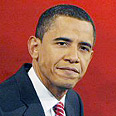
Obama: My commitment to Israel is unshakable
In exclusive Yedioth Ahronoth interview, US presidential hopeful says 'all facts of our national power will be required to stop the Iranians from pursuing nuclear weapons'
Over the past few weeks, his rivals have spread rumors that Obama attended a madrasa (Islamic religious school) in Indonesia, which served as a terrorist training camp.
On Tuesday Obama provided his written answers to questions presented by the Yedioth Ahronoth daily newspaper. In the exclusive interview, which will be published Friday, he presents his views on Israel, the Palestinians and Iran.
Some people in Israel and some Jewish American leaders have expressed concern that you would be more sympathetic to the Arab side because of your Muslim background. How do you respond to this argument?
First it is important to establish the facts. Here are the facts: I am not a Muslim and I never have been. I never attended a madrasa. I did not take my oath of office on a Koran. I am a committed Christian. I lived in Indonesia for four years as a child, where I attended secular schools. I took my oath of office on our family Bible.
People who know the facts are not worried about my commitment to Israel's security and the US-Israel relationship. I have overwhelming support among the Jewish community that knows me best, which is the Jewish community in Chicago. It may be that my family roots in Africa and my childhood experience in Indonesia give me some insights that allow me to practice effective diplomacy in the Muslim world. I certainly hope so. And that ability can be used to benefit American interests and Israel's security, and, I hope, help build a better relationship between both our countries and the Muslim world.
For many years, Israel has considered the occupant of the White House a very good friend. Will this friendship continue if you become president?
Absolutely yes. I will carry with me to the White House an unshakeable commitment to the security of Israel and the friendship between the United States and Israel. The US-Israel relationship is rooted in shared interests, shared values, shared history, and in deep friendship among our people. It is supported by a strong bipartisan consensus that I am proud to be a part of, and I will work tirelessly as president to uphold and enhance the friendship between the two countries.
You have said you would be ready to talk to "enemy leaders." Some Israelis are skeptical that just by speaking with the leaders of Iran, you could prevent them from producing a nuclear weapon. If diplomacy fails, would you support using force against Iran, as Israel did against Iraq in 1981?
I don't believe that diplomacy alone will stop the Iranians from pursuing nuclear weapons. I believe it will require all facts of our national power to achieve this important goal.
The gravest threat to Israel today comes from Iran, where a radical regime continues to pursue the ability to build a nuclear weapon, and continues its support for terrorism across the region. President Ahmadinejad continues his offensive denials of the Holocaust, and his disturbing denunciations of Israel? Recently he referred to Israel as a "deadly microbe" and a "savage animal." Threats of Israel's destruction cannot be dismissed as rhetoric. The threat from Iran is real, and my goal as president will be to eliminate it.
The time has come to talk directly to the Iranians, and to lay out our clear terms: an end to their pursuit of nuclear weapons; an end to their support of terrorism; and an end to their threats against Israel and other countries in the region. To achieve this goal, I believe that we must be prepared to offer incentives like the prospect of better relations and integration in the international community; as well as disincentives like the prospect of increased sanctions.
Full interview to be published on Ynetnews this weekend










